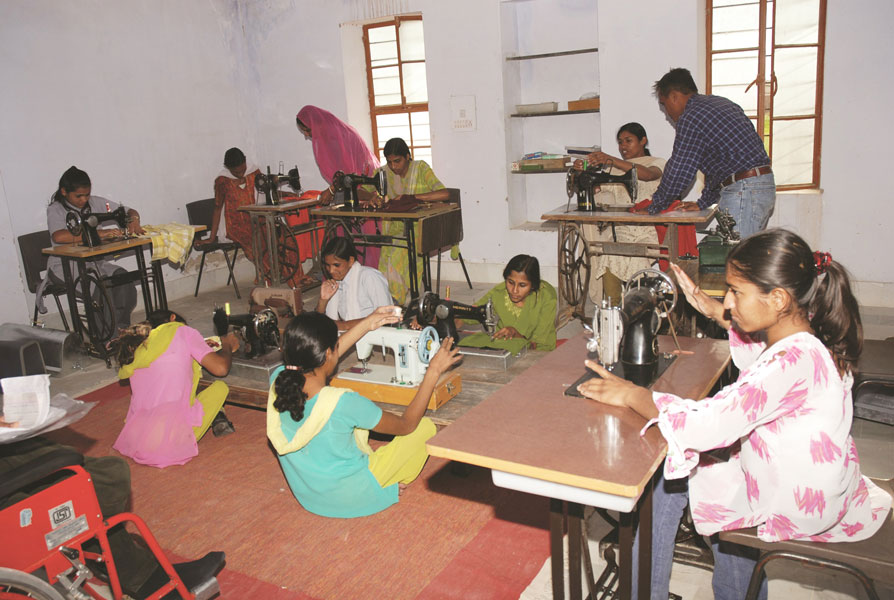FOCUS LITERACY
Literacy: the Bridge from Misery to Hope
After the overwhelming success in collecting books, registering volunteers and awarding the Nation Builder Award to teachers, Rotary India Literacy Mission now focuses on the challenging task of identifying and bringing back-to-school one lakh out-of-school children, within the age group of 6 to 14 years. This would include (a) Children at Risk (b) Differently-abled children and (c) Other children. These children are to be admitted to mainstream (preferably, government) schools.
Out-of-school children are of two types:
- Children who have never been enrolled into schools (particularly, children above the age of eight years and not enrolled in a school), and
- School Drop Outs (those who were enrolled in schools but did/could not continue with their education because of various reasons).
Who are the “Children at Risk”?
- Children of convicts
- Children of sex workers
- Children of migrant workers, e.g., i) brick kiln workers ii) workers at large construction sites
- Children who are victims of exploitative labour practices, e.g., children who work in i) automobile garages, ii) canteens/tea stalls, iii) industries like brassware, glassworks, carpet weaving, matches/crackers, leather works, bidi-making, iv) household jobs, v) other unorganised micro/small enterprises, etc.
- Children otherwise at risk, e.g., i) juvenile offenders,
ii) roadside beggars, iii) orphans, iv) home-less children, v) children of lepers, vi) H.I.V. positive children, vii) transgender/third gender children.
Who are the Differently-abled Children?
- Children with vision impairment
- Children with hearing impairment
- Children suffering from autism
- Children with learning disorders, etc.
How to identify and work with/for Children-at-Risk & Differently-abled Children?
- The needs of these special children are multiple. Usually, they cannot be straightaway admitted to mainstream schools and some of them may need special schools.
- Rotarians may not, therefore, find it easy to identify and work directly for/with most categories of these children.
- An effective way of identifying and working towards educating the out-of-school children of these categories is to partner with NGOs that have credible track record of dealing with them.
- There are several good NGOs working with each category of special children.
- Centrally, the Rotary India Literacy Mission office will identify such NGOs and enter into partnership with them. Their details will be shared on the website www.rotaryteach.org.
- The Child Development Committees at the District and Club level need to keep visiting the website to get updates on partnerships.
- The partnership will generally mean augmenting the capacity of the NGO concerned to enhance the number of such children that it is currently helping educate — if the number of children it is sending to school is 100 now, let us help raise the number to 200.
- 50 percent of the cost of educating such children, up to an upper limit of ₹1000 per child, will be reimbursed to the club that seeks the assistance of the selected partner NGO.
How to work directly with such children?
- It is possible for a Rotary club to directly work with some groups of children, an example could be, children of brick kiln workers or of workers at large construction sites.
- For example, to make children of construction workers literate, the steps to follow would be:
- meet the builders’ association in the town/city,
- obtain list of large construction sites engaging migrant labour,
- use the services of registered volunteers,
- download the Survey Form for Child Development Project (Form No. C1) from www.rotaryteach.org and ask volunteers to use them to enumerate the out-of-school children at the site,
- counsel parents and
- either, get these children into regular schools, or start a school for them at the site itself.
Alternatively, contacting schools adopted by clubs for the Happy Schools Project would help to collect information about children who are out-of-school.
Awarding scholarships to meritorious students will also motivate them to join schools. This scheme, which already exists under the Child Development project, can also be used.
Using Advocacy to Bring Differently-abled Children Back-to-School
A project can be done for differently-abled children using the provisions of ‘Right to Education Act’ to get them back into mainstream schools. The process for this would include:
- Establish contact with local government authorities, use advocacy to ensure provision of amenities required in mainstream government schools.
- Ensure teacher sensitivity to the needs of differently-abled children.
- Organise appropriate training for the teachers.
Let us join hands to build the bridge towards literacy and help the children at risk.
Vocational Training Centres for Adult Literacy
Traditionally October is the vocational month in Rotary. In keeping with this tradition Rotary India Literacy Mission focuses on imparting Vocational Training for skill development under the Adult Literacy project of its T-E-A-C-H programme. Adult illiterates find it difficult to spare time for functional literacy unless coupled with employment opportunity.
Vocational training for skill development and skill up-gradation will be given to:
- Unemployed adult neo-literates, and
- Literate adults employed in low skilled jobs, Along with
- Functional literacy,
- Soft skill development, and
- Pride in the work they do.
How to give vocational training?
Vocational training can be imparted through:
- Establishment of a vocational training centre.
- Identifying an existing vocational centre and supporting it financially to increase or double the number of adults being trained.
- Rotarians with in-house vocational training centres to include unemployed adult neo-literates for training and certification.
To establish a vocational training centre one can avail the schemes of the National Skill Development Corporation and of similar organisations of the central/state governments so as to augment the income of unemployed adult illiterates/neo-literates and thus motivate them to seek literacy and vocational/skill development training.
Five points for Child Development Officers in Clubs:
- Identify NGOs already doing projects in area of child development and support them to add more children.
- Identify children at risk in the locality and approach schools to set up evening classes with teachers, meals and other amenities. eg. Child labour schools in Punjab.
- Identify drop outs from existing schools and provide evening/night schools with coaching to pass exams privately.
- Use e-learning facilities supported by teachers to reach children in orphanages and juvenile homes.
- Network with Government District Education Officers, police and social welfare departments where possible.








